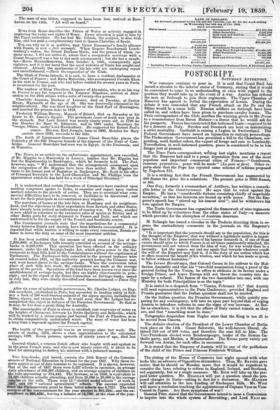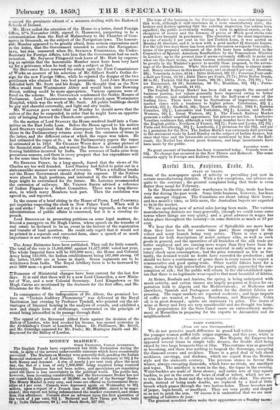The sitting of the House of Commons last night opened
with what looks like an advance of Opposition skirmishers. Thus, Mr. RixrEn gave notice that he should on Monday move that it would be expedient to consider the laws relating to reform in England, Ireland, and Scotland, not separately, but as a single measure. Mr. RICH will take up the pre- paid letter question. Mr. ILESDLAM will put a question about the pro- posed changes in Ionia—asking in fact for a discussion. Mr. HANKEY will call attention to the late funding of Exchequer Bills. Mr. WISE will move a resolution touching the appointment of Captain Vyse as Vice- Consul in Japan. Are these symptoms of war ? General PEEL stated that the Government intend to issue a Commission to inquire into the whole system of Recruiting; and Lord NAAS an-
uunced the proximate advent of a measure dealing with the Endowed Schools of Ireland.
Mr. Hurr called the attention of the House to a letter, dated Foreign Office, leth November 1858, signed G. Hammond, purporting to be a communication from the Earl of Malmesbury to the Chamber of Com- merce in Greenock, on the subject of the Navigation-laws. The honour. able Member appeared to be greatly afraid, from certain expressions used in the letter, that the Government intended to revive the Navigation- laws, but was reassured when Mr. SE Moos FrrzoisnAun, the Under- Secretary for Foreign Affairs, told him that the Government had no such intention. Mr. Seymour Fitzgerald took leave of Mr. Hutt by express- ing an opinion that the honourable Member must have been very hard up for a grievance when he took up such a subject as that.
Sir BENJAMIN HALL renewed the attack upon the First Commissioner of Works on account of his selection of Mr. Gilbert Scott's Gothic de- sign for the new Foreign Office, while ho rejected the designs of the two gentlemen who obained the two best premiums. Lord JOHN MANNERS defended both Mr. Scott and his design. He thought that as the New Office would front Westminster Abbey and would back into Downing Street, nothing could be more appropriate. Various opinions were of- fered on the scheme. Mr. CONINOHAM condemned the Gothic Houses of Parliament. Lord Patareasrosi made a fierce attack upon Westminster Hospital, which was the work of Mr. Scott. All public buildings should be gay and cheerful externally, and light and airy inside.
Mr. WALPOLE gave notice that on Monday he should move that the orders of the day be suspended, in order that he might have an opportu- nity of bringing forward the Church-rate question.
On the motion of Lord STANLEY the House resolved itself into a Com- mittee on the East India Loan. Before the House agreed to his motion Lord STANLEY explained that the discrepancy between his figures and those in the Parliamentary returns arose from the omission of items in the latter, and the different rates at which the rupee was taken. He had estimated the rupee at 2s. ; in the Parliamentary papers the rupee is estimated at ls. 101d. Sir CHARLES WOOD drew a gloomy picture of the financial state of India, and warned the House to be careful in sanc- tioning liabilities incurred by India. The revenues of India arise from precarious sources, and there is every prospect that her expenditure will be for some time below the income.
Sir EREELNE PERRY, in a long speech, feared that the views of Sir Charles are too well founded. Lord Stanley had failed to point out in a statesmanlike manner new sources of revenue. When a rebellion breaks out the Home Government should defray its expense. If the Natives were placed in high positions, and interested in the welfare of India, hope might be entertained for the future. Mr. LIDDELL recommended the extension of railways. Mr. VERNON SMITH advised a reference of Indian Finance to a Select Committee. There was a long discus- sion in which many Members took part. Then the resolution was agreed to, and reported.
In the course of a brief sitting in the House of Peers, Lord CAMPBELL put inquiries respecting the clock in New Palace Yard. When will it go and strike ? He could not say it is a striking reproach, as far as the administration of public affairs is concerned, but it is a standing re- proach.
Lord BROUGHAM in presenting petitions on some legal matters, de- livered a panegyric on Sir Hugh Cairns, whose speech on the transfer of real estate he declared to be an event in the history of the registration and transfer of land question. He could only regret that it would not be printed in a separate and corrected form, since a speech of so much importance is not made everyday.



























 Previous page
Previous page